Abhishek Mande
Exactly a year before we met, Chinese author Hong Ying was asked why she writes.
"I have to, to make money to survive," was her simple reply.
Hong Ying, 48, was raised in the slums of Chongqing on the Yangtze River in China and has been writing since she was 18.
She had moved to London in 1991 where she had settled down as a writer but moved back to China -- which she describes as 'my mother' -- in 2000.
At the Jaipur Literature Festival, rediff.com's Abhishek Mande caught up with Ying, who told him that the idea of an independent Tibet may not be such a good one after all.
Back at the session you were addressing, an Indian mother told you about her son travelling to a Chinese village, which sort of made me curious to know how you folks perceive Indians?
...
'Educated Chinese are really interested about India'
When an Indian boy goes to a Chinese village, people think that he may be an evil person. So they don't really pay attention to what he might be saying or wearing but rather keep wondering about what he may be thinking.
Is this scepticism seen across the country or in just the rural pockets? For instance what is it like in Beijing? Do the educated Chinese have similar views?
No, these perceptions largely exist in the villages. Educated Chinese -- like my friends and me -- are really interested about India.
We want to come here and look at people. We are interested about India, Indian films and its music. Many of us quite like Indian culture.
Is this your first trip to India?
Yes. I just landed in Delhi and have come to Jaipur. From here, I return to Delhi and from there I go back to Beijing.
'I found India just as I had imagined it to be'
I found India just as I had imagined (it to be). I like it and I'm enjoying it here.
Can you describe what you had imagined India to be?
I always thought of it as very colourful, with a lot of religions and gods and the fact that the streets can be very dirty (laughs).
The slums here are so much like my home where I grew up.
I couldn't help noticing that everyone has a lot of time. Things move slowly. In China, many of us live for money. In India, you seem to enjoy life first.
Have you read Indian authors? Who are your favourite authors and why?
Oh yes, I have read Indian authors!
Rushdie, Naipaul, Adiga, Roy and Tagore
I quite like Salman Rushdie's Midnight's Children. His writing style is incredible and fantastic. It shows how difficult people's lives can be. However I must say that I didn't enjoy some of his recent books. They seem somehow repetitive.
V S Naipaul (on the other hand) is far stronger than Rushdie. His style is more non-fiction and journalistic much different than Salman's, which is poetic.
I also liked Aravind Adiga. He makes a parody but he presents a good picture of present-day India.
Arundhati Roy also gave me a good idea about what real India is like. You understand its culture, relationships, how marriages work etc.
I used to read Rabindranath Tagore when I was a child. It used to be difficult to get his work in Chinese. But Tagore wrote beautifully. You can really learn how to write (simply by reading him).
'Things are really changing in China. Now there is space'
You have mentioned that China is like your mother and that you wouldn't be able to leave it. What is it like being an author in China?
Oh, it is very good to be a writer in China. We have a lot of people there so there are a lot of readers (laughs)! First prints of my books run into one lakh copies. If you are an author in China, you don't need to worry about circulation.
What about freedom of expression?
Twenty years ago, you felt frightened, but now things are really changing. Now there is space. With the Internet, everyone has access to read what they want and write what they want.
If the government shuts down your blog, you can start another one.
Correct me if I am wrong. You are saying there is freedom of expression in China?
Yes.
'I don't believe what the government tells me about Tibet'
You can express freely what you want without any government interference or without the government looking over your shoulder?
Yes. I feel free.
I am invited to speak by universities where I talk about what I want. Once, when I was talking in a room that had CCTV, the organisers requested me to be careful about what I spoke about but they were only asking for my sake.
What do you think about Tibet?
My hometown in Sichuan is close to Tibet. So I know Tibetans very well.
Tibet is different from other places in China. Tibetans have a distinct culture, religion, language and voice. I want Chinese cities to have the kind of peace I see in Tibet.
I don't believe what the government tells me about Tibet or what anyone else has to say about it...
Should Tibet be freed?
This is difficult. It is a very special place. People should respect it.
'Chinese should understand Tibetans and vice versa'
Do you feel the Chinese respect Tibet's culture?
I am not sure.
You are talking like a diplomat...
There are many Chinese who live in Tibet too. And Tibet has many issues -- education, hospitals etc.
What happened in 2008 (the Tibetan unrest) was very tragic but I feel that there could be another way (other than) independence.
So you are advocating a more moderate approach?
Yes. First the Chinese should understand the people of Tibet and vice versa.

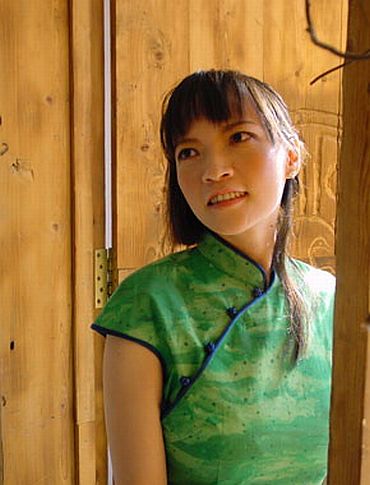

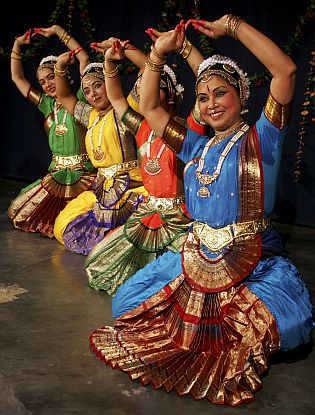
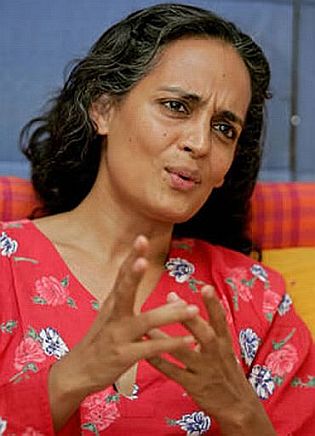
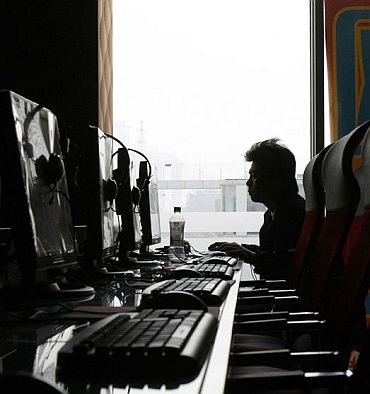

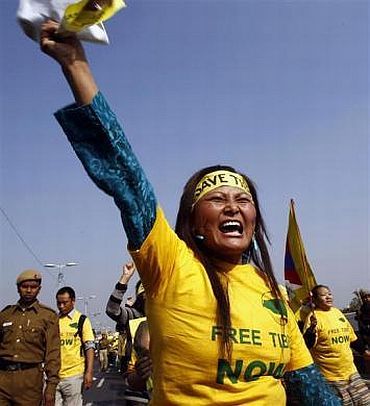
article